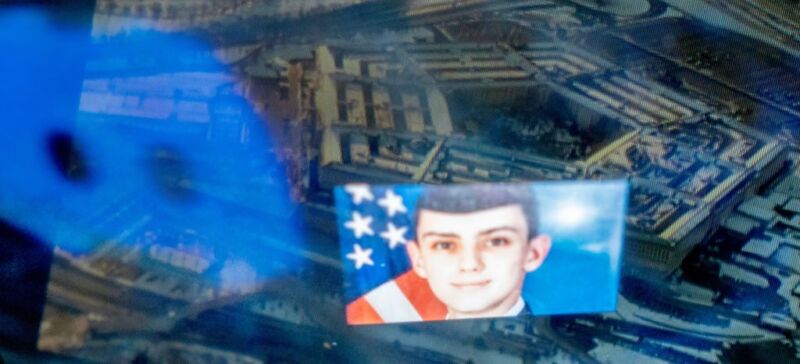
On Friday, Air Force National Guard airman Jack Teixeira was charged with two counts under the Espionage Act, alleging his unlawful gathering and unauthorized removal of top-secret military documents. These documents spread widely online after Teixeira allegedly spent months leaking classified information on a private Discord server. At his first court appearance, Teixeira was not required to enter a plea, but he is due back in court Wednesday, NBC News reported.
If he’s eventually found guilty, Teixeira could face up to 10 years in prison for each count, according to an affidavit from the Federal Bureau of Investigation’s special agent Patrick Lueckenhoff. His affidavit did not detail all the information that the FBI has gathered on Teixeira, but Lueckenhoff said that it shared enough information to demonstrate “sufficient probable cause for Teixeira’s arrest.”
Since Teixeira’s arrest, many have wondered how the FBI tracked him down. Lueckenhoff’s affidavit provides a timeline for the FBI’s manhunt and confirms that Discord played a major role in his arrest.
On April 10, the FBI interviewed one of the Discord users on the now-deleted server where Teixeira had served as an administrator. That Discord user disclosed key information that assisted the FBI, including confirming that the Discord admin’s real name was Jack, that he seemed to live in Massachusetts, and that he claimed to serve in the Air National Guard.
The FBI then requested assistance directly from Discord, which on Friday confirmed it had been cooperating with the investigation. Lueckenhoff’s affidavit showed that on April 12, Discord “provided the FBI with records pursuant to legal process.” These records included account and subscriber information, revealing that the Discord admin’s name was “Jack Teixeira” and that his billing address was “a specific residence in North Dighton, Massachusetts.”
On April 13, the same Discord user who had previously spoken to the FBI picked Teixeira out from a lineup of photos from the Registry of Motor Vehicles. That day, the FBI arrested Teixeira, and Discord released a statement to Ars, explaining that Teixeira’s alleged activity was prohibited on the platform.
“We are aware that law enforcement officials have arrested the individual accused of illegally posting classified material on our platform,” Discord’s spokesperson said. “We have cooperated with officials and remain committed to doing so as this investigation continues.”
Discord said that its terms of service “expressly prohibit” any illegal or criminal activity on the platform, “which includes the sharing of documents on Discord that may be verifiably classified.” The platform also confirmed that other Discord users were affected. Discord apparently has “banned users involved with the original distribution of the materials, deleted content,” and “issued warnings to users who continue to share the materials in question.”
Identifying classified materials unlawfully shared on its platform is not a straightforward process for Discord, though. In a blog, Discord noted that “only authorized government personnel can determine whether a document is classified, unclassified, or even authentic. And currently, there is no structured process for the government to communicate their determinations to platforms like Discord.”
Discord’s private channels are a major draw for some users. On Teixeira’s private server, which was called “Thug Shaker Central,” roughly 25 members formed the community specifically to have a private place to heatedly discuss guns, attempt to track covert military operations, and swap memes described by outlets like Business Insider and The Washington Post as racist and antisemitic. Discord’s statement suggested that it could not be expected to preserve privacy on servers found to be promoting irresponsible online behavior.
“While Discord places a premium on the privacy of our users, we believe that our platform best serves the needs of all when we collectively engage in responsible online behavior,” Discord’s spokesperson said.
https://arstechnica.com/?p=1932356

